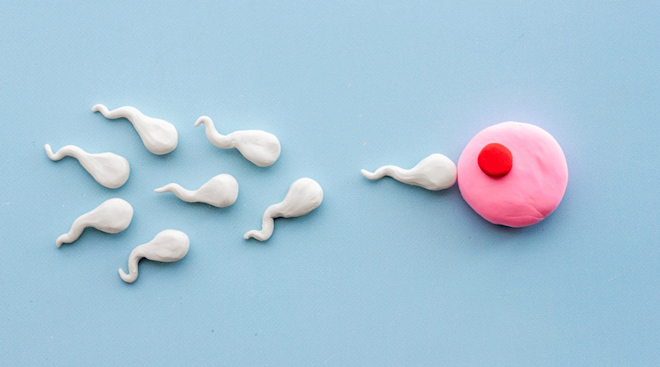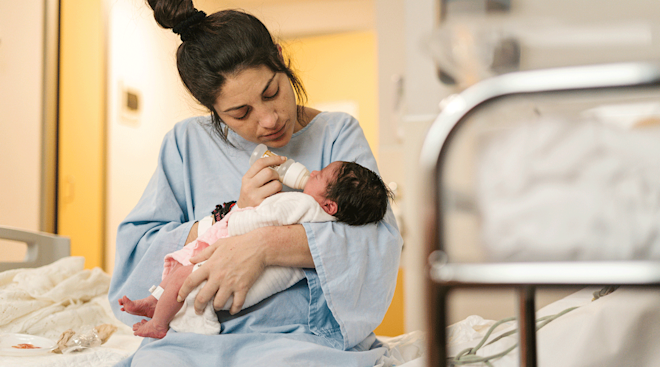7 Ways to Make Baby Smarter Before Birth
Every parent wants to set their child up for success—so the promise of boosting baby’s IQ before they’re even born is, of course, highly appealing. Moms-to-be and pregnant people play Beethoven and read books to their bellies with the hope to foster baby’s development in utero. “We become mothers from the moment that we find out we’re pregnant, as the choices we make can affect the growth and development of our unborn child,” says Katie Friedman, MD, a Florida-based pediatrician and cofounder of Forever Freckled.
But what actually works? Research has found a few different methods that help set baby—and you—up for success during pregnancy. But it’s important to remember that every pregnancy is different. Below, experts break down some ways to boost baby’s development and intelligence before they’re born. Take each with a grain of salt, and bear in mind that you should always reach out to your provider for tailored advice.
Exercising during pregnancy is a proven way to help boost baby’s development—and you don’t have to run a marathon to reap the benefits. According to Meleen Chuang, MD, an ob-gyn and medical director of women’s health at the Family Health Centers at NYU Langone, exercise increases blood circulation, which delivers both oxygen and nutrients to baby’s developing brain. “It also promotes the release of endorphins, which can reduce stress and improve the mother’s mood, leading to a healthier environment for the baby’s development,” she adds. Research backs this up, as two 2012 studies found that prenatal exercise can actually improve baby’s cognitive development.
The American College of Obstetricians and Gynecologists (ACOG) recommends that pregnant women get at least 150 minutes of moderate exercise weekly. However, while there are several benefits to safe prenatal exercise, Rebekah Mustaleski, CPM-TN, a certified professional midwife and compression director with Motif Medical, caveats that the correlation between Mom’s exercise patterns and baby’s brain power isn’t necessarily direct: “It’s not clear if the exercise itself is the benefit, or the other health changes that often accompany increased physical activity, such as improved nutrition, hydration, and better sleep.”
According to Mustaleski, keeping daily stress levels under control is crucial. “I like to remind my clients that how you’re taking care of yourself is how you’re taking care of your baby,” she says. “When we experience stress, whether it’s daily traffic or a complicated work situation, our body enters ‘fight or flight’ mode and floods our system with cortisol and adrenaline.” According to March of Dimes, previous research has found that prenatal stress can lead to issues with attention, mental health and immune function in children later on in life. In fact, studies from 2013, 2015 and 2020 have all found that high levels of stress and cortisol during pregnancy can negatively affect baby’s development and health.
“Prioritize making time every day for the activities that help you destress. It could be taking a bath, talking to a friend, meditating, exercising or whatever else makes you feel like the world is a better place,” Mustaleski suggests. “When you do these activities, your body flushes the stress hormones out of your system and allows your body to return to the ‘rest and digest’ state.”
You might feel a little silly talking to your pregnant belly, but the payoff may be worth it. “The baby can hear sounds from outside the womb as early as the second trimester,” Chuang says. “This stimulation can help with early language acquisition and cognitive development.” In a 2013 study, when expectant women were given a recording to play toward the end of their pregnancy that included a made-up word, the babies were able to recognize the word and its variations after they were born. (How could researchers tell, you ask? Neural signals showed babies recognized the pitch and vowel changes in the fake word.) The babies who heard the recording most frequently had the strongest response, suggesting that language learning begins in utero. It’s important to note, though, that while talking aloud to baby can help promote early word recognition, there’s no concrete evidence this actually increases baby’s intelligence in the long run.
Another reason to talk out loud to baby? Even within the first two months of life, baby can recognize voices, especially those of their parents. “The voice of their mother becomes a familiar sound that can help soothe and make them feel safe,” Friedman explains. “Since babies are able to recognize the voices they became familiar with while in utero, reading to them helps with bonding.”
One of the first methods that comes to mind when it comes to boosting baby’s development is probably playing classical music for them during pregnancy. But while hearing Beethoven’s symphonies in the womb certainly won’t do any harm, this isn’t quite the brain booster it’s made out to be. “Although relaxing for Mommy, there’s no concrete research that establishes a relationship between playing classical music prenatally and increasing your baby’s intelligence,” Friedman says. In fact, in 2010 a group of psychologists at the University of Vienna conducted a comprehensive review of all previous studies on this topic, and found the theory to be without merit. “I recommend listening to Mozart to everyone, but it will not meet expectations of boosting cognitive abilities,” says Jakob Pietschnig, lead author of the study.
While the so-called Mozart Effect may be a myth, there are other ways music and singing during pregnancy can benefit baby’s development. A 2013 study found that, similar to word recognition, babies who listened to “Twinkle Twinkle Little Star” during the third trimester were better able to recognize it than those who didn’t. Another 2023 study also found that babies safely exposed to music during pregnancy were more responsive to speech sounds. Both suggest that playing music for baby during pregnancy may also help them with speech and language development after birth.
There’s nothing fishy about it: Including seafood in your weekly dinner menu rotation may help improve baby’s cognitive development. “Seafood, particularly fatty fish like salmon, is rich in omega-3 fatty acids, which are essential for brain development,” Chuang explains. “Omega-3 fatty acids have been linked to improved cognitive function and a reduced risk of developmental issues in children.” In fact, a 2016 study found that kids whose mothers ate three to four servings of fish per week scored higher on cognitive tests than children born to moms who ate less fish. The study partially attributed these findings to the benefits of fatty fish like salmon and sardines, which contain higher levels of DHA (an omega-3 fatty acid) than leaner fish.
But for all their benefits, Mustaleski says that omega-3 fatty acids are often under-consumed, especially in comparison to omega-6 fatty acids. This is why expecting women are encouraged to consume DHA as a prenatal supplement).
While eating fish during pregnancy is beneficial, you’ll want to ensure you do so in moderation and “choose low-mercury options to avoid any potential risks,” Chuang notes. (A bonus: Fatty fish also often contain less mercury than other fish.)
Another eggs—another superfood—during pregnancy may help set baby up to be a faster learner with a better memory. Eggs are packed with vitamin A, riboflavin, pantothenic acid, vitamin B12, phosphorus and choline, a member of the vitamin B family that’s essential for pregnant women. “[Choline is] crucial for brain development and memory function,” Chuang says. “It plays a vital role in the production of neurotransmitters, which are essential for brain signaling and can help support baby’s cognitive development.”
A 2022 study from Cornell University found that consuming choline during pregnancy improved the attention span of offspring up to at least seven years after birth. A 2023 review also notes that egg consumption during pregnancy supports the baby’s nervous system and cognitive development, as well as lowers Mom’s risk of gestational diabetes, blood pressure issues and anemia.
While the research is undeniable, Mustaleski reminds expectant parents there isn’t a proven cause-and-effect link. “Eggs are high in choline and omega-3 fatty acids, both of which are important for the development of the central nervous system and the brain,” Mustaleski says. “But do they actually make your baby smarter? I don’t think we can definitively say that.”
This one can’t be stressed enough—the American Academy of Pediatrics (AAP) strongly advises against smoking, drinking alcohol and using drugs while pregnant. “Drinking alcohol during pregnancy is one of the leading causes of preventable birth defects and learning disabilities in newborns,” Friedman says. “There’s no amount of alcohol that’s deemed safe to drink during pregnancy. Abstaining from drinking alcohol is imperative for the intellectual development of a baby.”
While the above habits may help boost baby’s brain function and development in-utero, remember that each pregnancy—and person—is different. “The health and development of the baby can be influenced by various factors,” Chuang says. “Following a healthy lifestyle, including proper nutrition, regular exercise and positive mental well-being, can contribute to baby’s overall health and intelligence.”
Please note: The Bump and the materials and information it contains are not intended to, and do not constitute, medical or other health advice or diagnosis and should not be used as such. You should always consult with a qualified physician or health professional about your specific circumstances.
Plus, more from The Bump:
Meleen Chuang, MD, is an ob-gyn and medical director of women’s health at the Family Health Centers at NYU Langone. She earned her medical degree from SUNY Stony Brook.
Katie Friedman, MD, is a Florida-based pediatrician and cofounder of Forever Freckled. She specializes in pediatric emergencies and received her medical degree from Rosalind Franklin University of Medicine and Science in Illinois. She completed her residency at Jackson Memorial Hospital in Florida.
Rebekah Mustaleski, CPM-TN, IBCLC, is a certified professional midwife specializing in evidence-based maternity care. She co-founded Roots & Wings Midwifery in Knoxville, Tennessee. Mustaleski received her bachelor’s degree in psychology from Centre College and worked as a doula and birth photographer prior to establishing Roots & Wings.
Scientific World Journal, Maternal Aerobic Exercise during Pregnancy Can Increase Spatial Learning by Affecting Leptin Expression on Offspring's Early and Late Period in Life Depending on Gender, September 2012
Cognitive Science (Hauppauge), Maternal Exercise and Cognitive Functions of the Offspring, December 2015
American College of Obstetricians and Gynecologists, Exercise During Pregnancy, March 2022
March of Dimes, Stress and pregnancy, February 2023
Obstetric Medicine, Effects of prenatal stress on pregnancy and human development: mechanisms and pathways, June 2013
Advances in Neurobiology, Prenatal stress and its effects on the fetus and the child: possible underlying biological mechanisms, January 2014
The Journal of Pediatrics, Maternal Stress During Pregnancy Predicts Infant Infectious and Noninfectious Illness, January 2021
PNAS, Learning-induced neural plasticity of speech processing before birth, August 2013
Intelligence, Mozart effect–Shmozart effect: A meta-analysis, June 2010
PLoS One, Prenatal Music Exposure Induces Long-Term Neural Effects, October 2013
University of Barcelona, Listening to music during pregnancy benefits the baby’s brain’s ability to encode speech sounds, December 2023
American Journal of Epidemiology, Maternal Consumption of Seafood in Pregnancy and Child Neuropsychological Development: A Longitudinal Study Based on a Population With High Consumption Levels, February 2016
Cornell Chronicle, Choline during pregnancy impacts children’s sustained attention, January 2022
Frontiers in Animal Science, Benefits, perceived and actual risks and barriers to egg consumption in low- and middle-income countries, November 2023
Learn how we ensure the accuracy of our content through our editorial and medical review process.
Navigate forward to interact with the calendar and select a date. Press the question mark key to get the keyboard shortcuts for changing dates.




















































